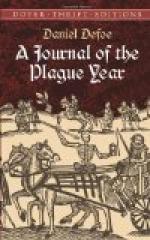They did tell me, indeed, of a nurse in one place that laid a wet cloth upon the face of a dying patient whom she tended, and so put an end to his life, who was just expiring before; and another that smothered a young woman she was looking to when she was in a fainting fit, and would have come to herself; some that killed them by giving them one thing, some another, and some starved them by giving them nothing at all. But these stories had two marks of suspicion that always attended them, which caused me always to slight them and to look on them as mere stories that people continually frighted one another with. First, that wherever it was that we heard it, they always placed the scene at the farther end of the town, opposite or most remote from where you were to hear it. If you heard it in Whitechappel, it had happened at St Giles’s, or at Westminster, or Holborn, or that end of the town. If you heard of it at that end of the town, then it was done in Whitechappel, or the Minories, or about Cripplegate parish. If you heard of it in the city, why, then it happened in Southwark; and if you heard of it in Southwark, then it was done in the city, and the like.
In the next place, of what part soever you heard the story, the particulars were always the same, especially that of laying a wet double clout on a dying man’s face, and that of smothering a young gentlewoman; so that it was apparent, at least to my judgement, that there was more of tale than of truth in those things.
However, I cannot say but it had some effect upon the people, and particularly that, as I said before, they grew more cautious whom they took into their houses, and whom they trusted their lives with, and had them always recommended if they could; and where they could not find such, for they were not very plenty, they applied to the parish officers.
But here again the misery of that time lay upon the poor who, being infected, had neither food or physic, neither physician or apothecary to assist them, or nurse to attend them. Many of those died calling for help, and even for sustenance, out at their windows in a most miserable and deplorable manner; but it must be added that whenever the cases of such persons or families were represented to my Lord Mayor they always were relieved.
It is true, in some houses where the people were not very poor, yet where they had sent perhaps their wives and children away, and if they had any servants they had been dismissed;—I say it is true that to save the expenses, many such as these shut themselves in, and not having help, died alone.
A neighbour and acquaintance of mine, having some money owing to him from a shopkeeper in Whitecross Street or thereabouts, sent his apprentice, a youth about eighteen years of age, to endeavour to get the money. He came to the door, and finding it shut, knocked pretty hard; and, as he thought, heard somebody answer within, but was not sure, so he waited, and after some stay knocked again, and then a third time, when he heard somebody coming downstairs.




